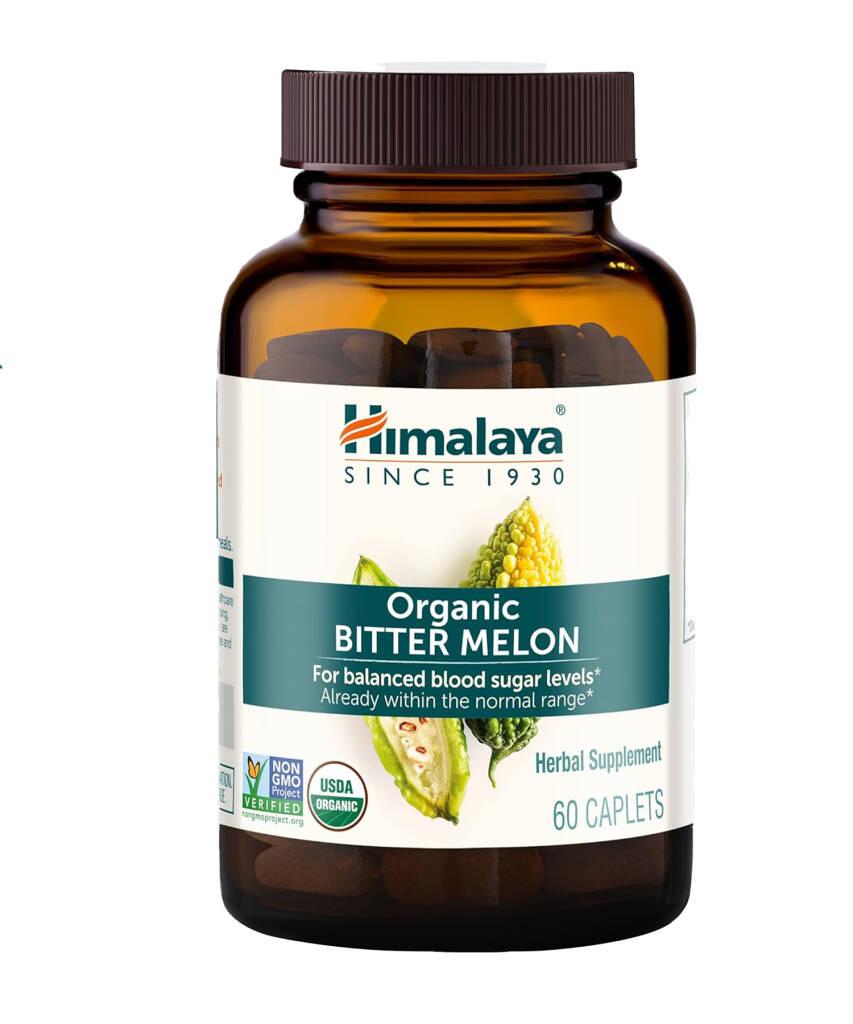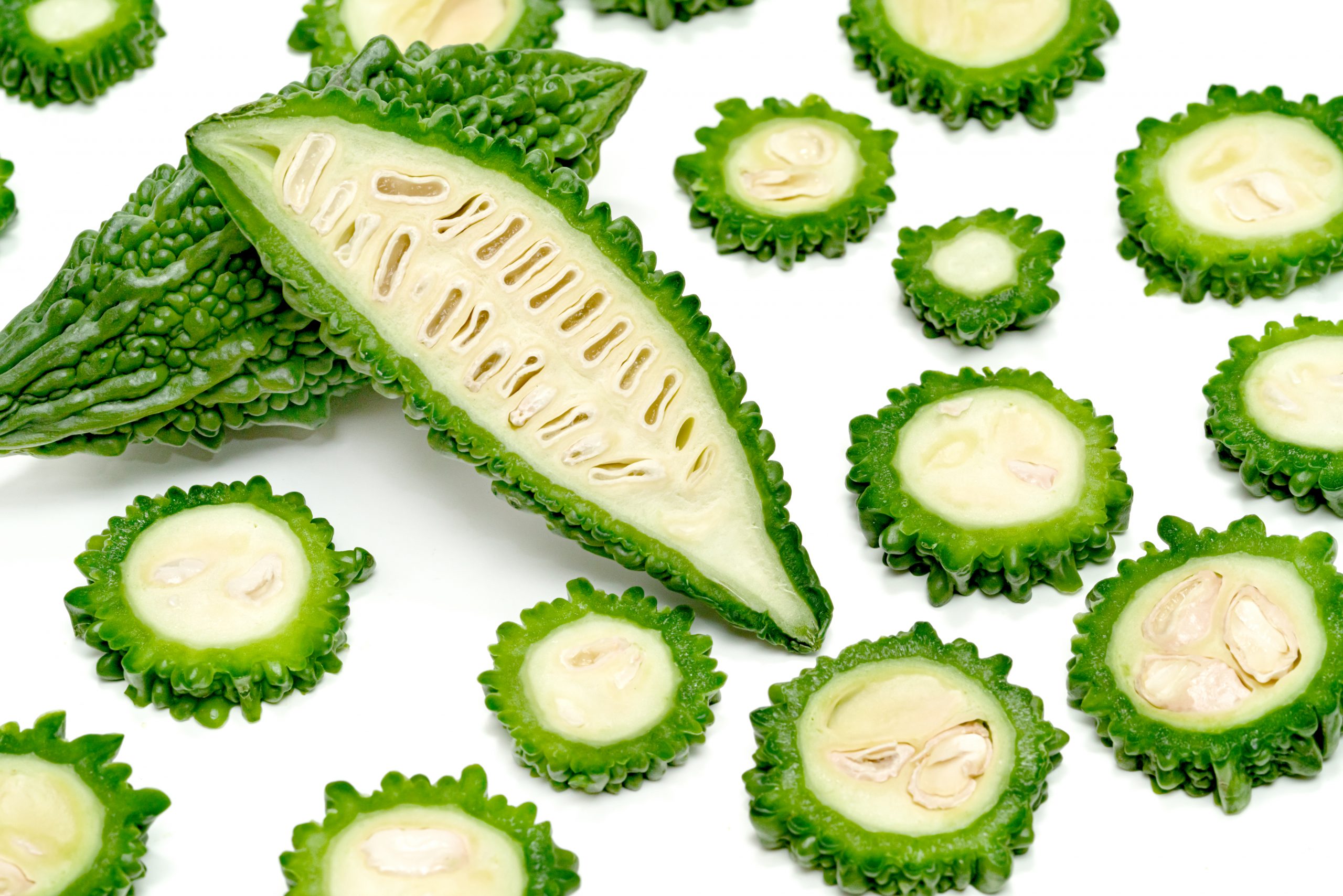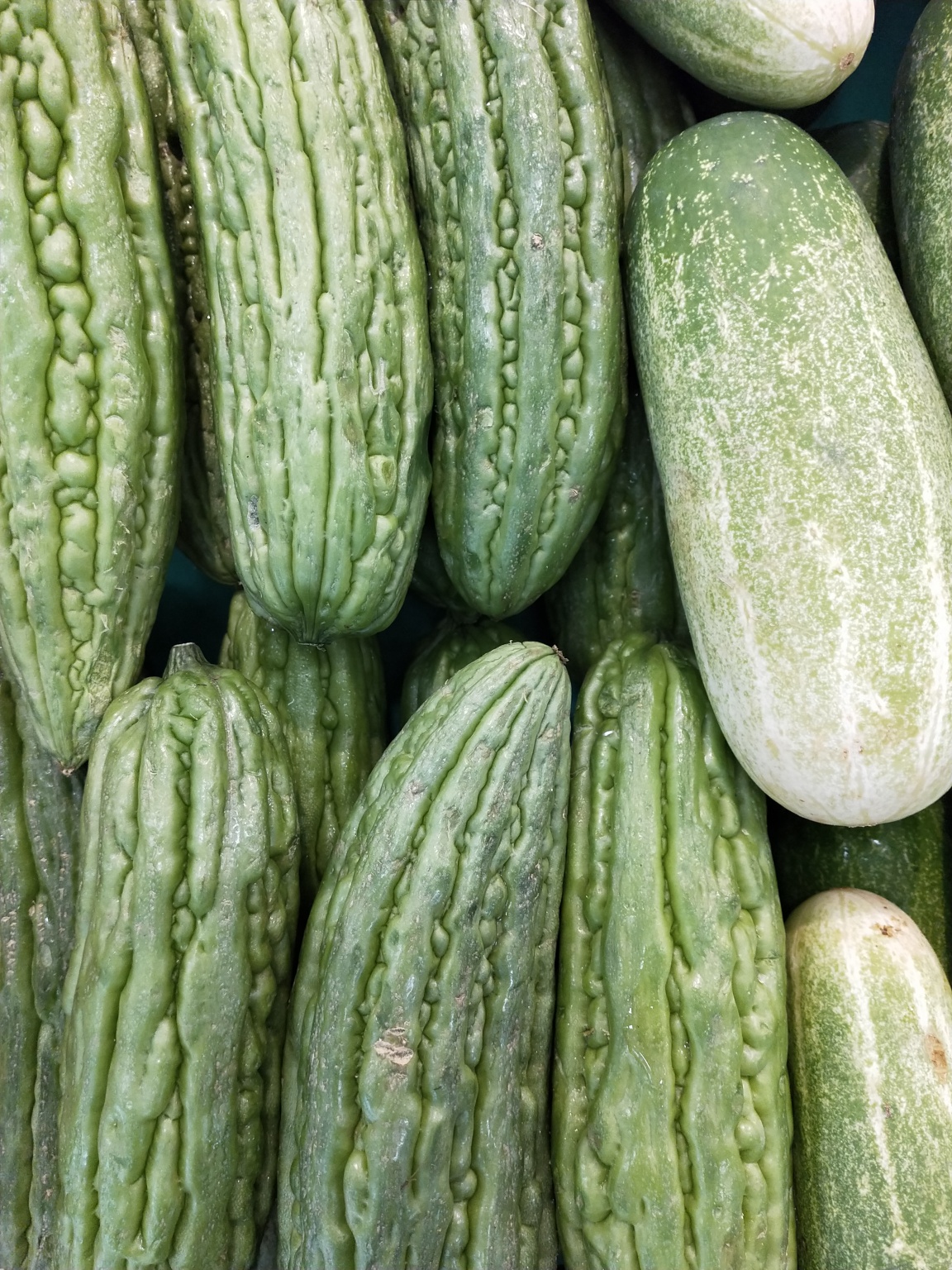
The Research: Benefits of BITTER MELON


Bitter melon, also known as Momordica charantia L., is a unique fruit widely recognized for its bitter taste and its traditional use in various global cultures as a medicinal herb. Historically, it has been most lauded for its potential in diabetes management. However, recent scientific investigations have broadened our understanding of its therapeutic benefits.

Recent research highlights the potential of bitter melon to combat obesity and high cholesterol, especially when tested against high-fat diets in animal studies. These benefits are linked to the fruit’s ability to influence fat metabolism, primarily by interacting with certain enzymes, including AMPKs, and impacting genes and receptors such as PPARs, LXRs, and PGC-1α in the liver and muscles. Moreover, studies suggest that bitter melon can also alter the way fat cells develop. Numerous reviews have delved deeper into its various health benefits, particularly its role in diabetes management, and consistently emphasizing both its efficacy and safety profile.
Body Weight & Fat Control:
Fat Burning Mechanisms:
Energy and Heat Release:
Influencing Fat Cells:
Diabetes, obesity, and metabolic syndrome are becoming epidemic both in developed and developing countries in recent years. Complementary and alternative medicines have been used since ancient era for the treatment of diabetes and cardiovascular diseases. Bitter melon is widely used as vegetables in daily food in Bangladesh and several other countries in Asia. The fruits extract of bitter melon showed strong antioxidant and hypoglycemic activities in experimental condition both in vivo and in vitro. Recent scientific evaluation of this plant extracts also showed potential therapeutic benefit in diabetes and obesity related metabolic dysfunction in experimental animals and clinical studies. These beneficial effects are mediated probably by inducing lipid and fat metabolizing gene expression and increasing the function of AMPK and PPARs, and so forth. This review will thus focus on the recent findings on beneficial effect of Momordica charantia extracts on metabolic syndrome and discuss its potential mechanism of actions.
Effect of Bitter Melon on Body Weight, Obesity, and Adipocyte Dysfunction
Body weight gain and abdominal fat deposition are the early signs of obesity. Bitter melon extract showed useful benefit on body weight gain and fat deposition Several investigational reports suggest that bitter melon can reduce body weight in high fat diet induced obesity in laboratory animals. Bitter melon (0.75% of diet) supplementation prevented the body weight gain and visceral fat mass significantly in rats fed high fat diet. This weight reduction may be a result of increased fatty acid oxidation which ultimately facilitates weight reduction. Moreover, the bitter melon extract supplementation reduced the peritoneal fat deposition in rats fed a high fat diet. In another study, bitter melon significantly decreased the weights of epididymal white adipose tissue (WAT), visceral fat, and the adipose leptin and resistin mRNA levels in C57BL/6J mice fed with a high-fat (HF) diet. Bano et al. reported that 2 mL/day dose of aqueous extract of bitter melon significantly reduced body weight gain in rats. A recent study also showed that the seed oil supplementation of the plant reduced body weight and fat mass in mice fed a high fat diet.
The authors declare no conflict of interest.
Richter E, Geetha T, Burnett D, Broderick TL, Babu JR. Int J Mol Sci. 2023 Feb 28;24
T2DM is a complex metabolic disorder characterized by hyperglycemia and glucose intolerance. It is recognized as one of the most common metabolic disorders and its prevalence continues to raise major concerns in healthcare globally. Alzheimer’s disease (AD) is a gradual neurodegenerative brain disorder characterized by the chronic loss of cognitive and behavioral function. Recent research suggests a link between the two diseases. Considering the shared characteristics of both diseases, common therapeutic and preventive agents are effective. Certain bioactive compounds such as polyphenols, vitamins, and minerals found in vegetables and fruits can have antioxidant and anti-inflammatory effects that allow for preventative or potential treatment options for T2DM and AD. Recently, it has been estimated that up to one-third of patients with diabetes use some form of complementary and alternative medicine. Increasing evidence from cell or animal models suggests that bioactive compounds may have a direct effect on reducing hyperglycemia, amplifying insulin secretion, and blocking the formation of amyloid plaques. One plant that has received substantial recognition for its numerous bioactive properties is Momordica charantia (M. charantia), otherwise known as bitter melon, bitter gourd, karela, and balsam pear. M. charantia is utilized for its glucose-lowering effects and is often used as a treatment for diabetes and related metabolic conditions amongst the indigenous populations of Asia, South America, India, and East Africa. Several pre-clinical studies have documented the beneficial effects of M. charantia through various postulated mechanisms. Throughout this review, the underlying molecular mechanisms of the bioactive components of M. charantia will be highlighted. More studies will be necessary to establish the clinical efficacy of the bioactive compounds within M. charantia to effectively determine its pertinence in the treatment of metabolic disorders and neurodegenerative diseases, such as T2DM and AD.
Conclusion
In conclusion, the application of bitter melon in medicine remains in the initial processing stages, as scientists continue to uncover its numerous health benefits from its bioactive constituents [64]. M. charantia not only has the potential to be a safe and effective therapeutic method for individuals suffering from the complications of T2DM and AD but also as a cost-effective option to ease the economic and social burden these metabolic disorders have on the populations worldwide. Further research is needed to determine the exact effects of bitter melon on humans from a clinical standpoint.Competing Interests
The authors declare no conflict of interest.
Obesity can be ameliorated by some natural products such as polyphenol, flavones and saponin. As a typical medicinal plant, Momordica charantia L. (Cucurbitaceae) (bitter melon, BM) contains these natural chemicals and reduces diet-induced obesity in mice.
Objective: This study evaluates the metabolic effects of dietary BM supplement, investigates a global metabolic profile and determines associated perturbations in metabolic pathways.
Materials and Methods: Male C57BL/6 mice were fed with low-fat diet (LFD), high-fat diet (HFD) and HFD supplemented with 5% BM based on 37.6 g/kg body weight in average for 12 weeks, respectively. Then energy metabolism was quantified using PhenoMaster/LabMaster. The spectroscopy of urine was acquired by nuclear magnetic resonance and latent biomarkers were identified. Pattern recognition analysis was used to discriminate associated metabolic profiles.
Results: Dietary BM supplement reduced body weight gain (-0.15-fold, p < 0.01) and blood glucose levels (-0.19-fold, p < 0.01) in HFD-fed mice. Meanwhile, the levels of energy metabolism were enhanced (0.08-0.11-fold, p < 0.01). According to pattern recognition analysis, dietary BM supplement changed metabolic profiles in HFD-fed mice and the modified profiles were similar to those in LFD-fed mice. Finally, the mapping of metabolic pathways showed that dietary BM supplement primarily affected glucose metabolism-associated pathways.
The results indicated that BM improves weight loss in diet-induced obesity and elevate energy expenditure in HFD-fed mice. The pattern recognition with metabolic study may be used as a noninvasive detection method to assess the effects of dietary BM supplement on mouse energy metabolism.
Bitter Melon ☆☆☆☆☆ 5/5 Slim Down, Cholesterol Out – Naturally When adding Himalaya Organic Bitter Melon supplement to your diet, start by taking one pill…
The probiotic universe is vast, teeming with thousands of strains, each providing unique benefits. Your journey to gut health becomes personal with these probiotics, selected and formulated with specific...
The Recipe: Bitter Melon Juice Select the best Bitter melon or bitter gourd, is a tropical and subtropical vine of the family Cucurbitaceae. It...
The Recipe: Ash Gourd Juice Select the Best Ash Gourd, often known as winter melon, wax gourd, white pumpkin, or Chinese watermelon, is a...
The Research: BENEFITS of MEDITATION ON DIGESTION Power in Digestion Efficient digestion is essential for our health and vitality, yet its importance is often...
Navigating The World Of Living Microorganisms. Probiotics are a complicated topic. Probiotics are living microorganisms, mostly bacteria. The number of probiotic strains is vast...

